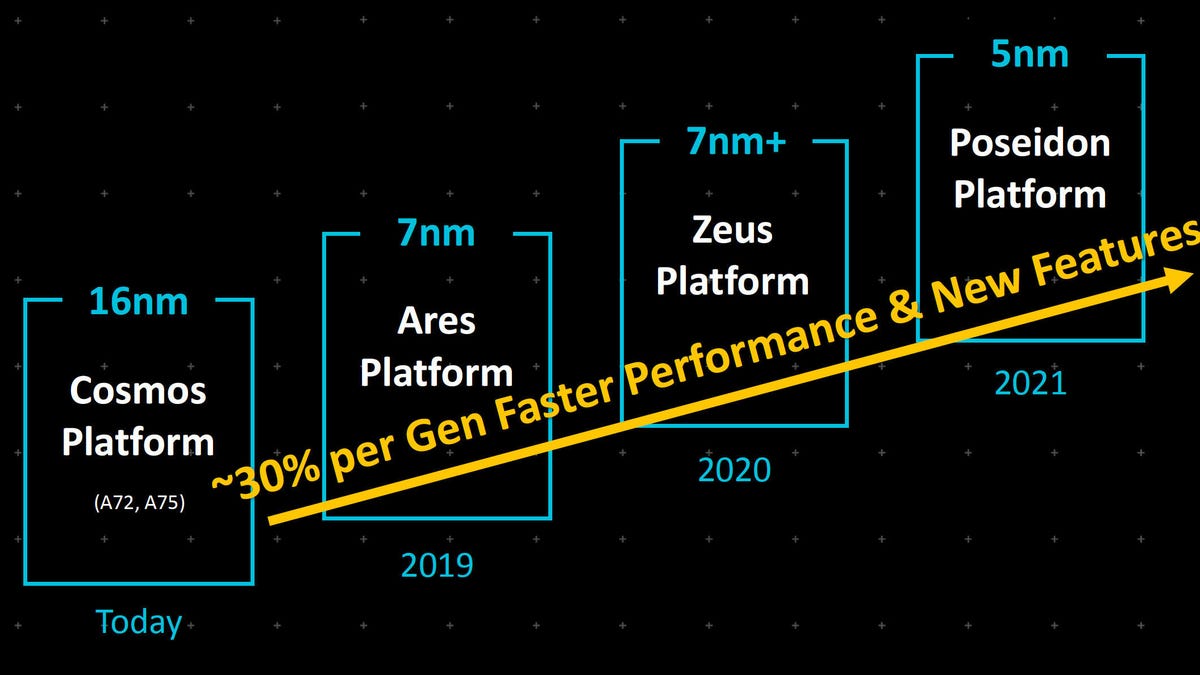Arm challenges Intel with Neoverse chips for heavy-duty computing
The chip technology powering your phone could next power the net services it's connecting to.

With its new Neoverse chip family, Arm promises steady performance improvements by way of its Ares, Zeus and Poseidon designs, due to arrive in products in 2019 to 2021.
Even if you haven't heard of Arm, you've known about its chip technology, because it powers just about every smartphone out there. Now with a new chip family called Neoverse, the UK company hopes every internet service your phone taps into will also be powered by Arm.
Arm got its start as Advanced RISC Machines, a spinoff from Apple's ill-fated Newton handheld computer in the 1990s. It licenses its processor technology to many companies, generally for power-sensitive devices like smartphones . Neoverse, though, is geared for computing infrastructure: servers, storage systems and networking gear, said Drew Henry, the general manager of Arm's year-old infrastructure business unit.
The effort will bear fruit with three new chip designs: Ares in 2019, Zeus in 2020 and Poseidon in 2021, the company plans to announce Tuesday at its Arm TechCon event in Silicon Valley. Each generation will bring a 30 percent speed boost over its year-earlier predecessor by virtue of new features and new chip manufacturing technology, Henry said.
The effort is aimed squarely at Intel , the decades-old chip giant that's suffered in recent years with an inability to move to new manufacturing technology. It dominates the server market with its Xeon processors and has generally fended off Arm server threats for years, but now it'll have a stronger challenge.
A new strategy for Arm servers
That's because the Neoverse chip designs are tuned for infrastructure products. They'll accommodate up to 256 processing cores, faster memory interfaces, reliability features, chip-to-chip interconnects, and virtual machine technology to squeeze more work out of computing hardware, Henry said.
The new brand, technology and investments into Neoverse are a significant change from previous efforts to build more-powerful Arm chips, said Patrick Moorhead, analyst at Moor Insights & Strategy. That earlier work relied more on Arm technology licensees such as Qualcomm, AppliedMicro, Ampere and Cavium making their own Arm-compatible designs.
"With today's announcement, Arm is doing exactly now what it should be doing -- developing its own 'big cores' intellectual property for customers to license with a long-term roadmap commitment," Moorhead said. "This increased investment is a direct result of the SoftBank acquisition."
A bigger Arm ecosystem
The new Neoverse and older Cortex product lines should help each other out because the broader scope should help enlarge the Arm software realm. The chip families will be compatible so they're able to run the same software, but some features will work better on the Neoverse products, Henry said.
Arm also is pushing hard to get its processors into personal computers, an effort that's shown only lackluster results so far. That work will continue with the Cortex technology, Arm said.
Arm-based servers haven't done particularly well, though allies such as Cavium push them and Hewlett Packard Enterprise is building an Arm-based supercomputer. As Henry sees it, though, they've done well in network and storage products and in specialized servers that handle things like security. Now Arm will have better products to spread farther.
"We're expecting it to be a high-growth, high-return business for us," Henry said.
Taking It to Extremes: Mix insane situations -- erupting volcanoes, nuclear meltdowns, 30-foot waves -- with everyday tech. Here's what happens.
Fight the Power: Take a look at who's transforming the way we think about energy.

